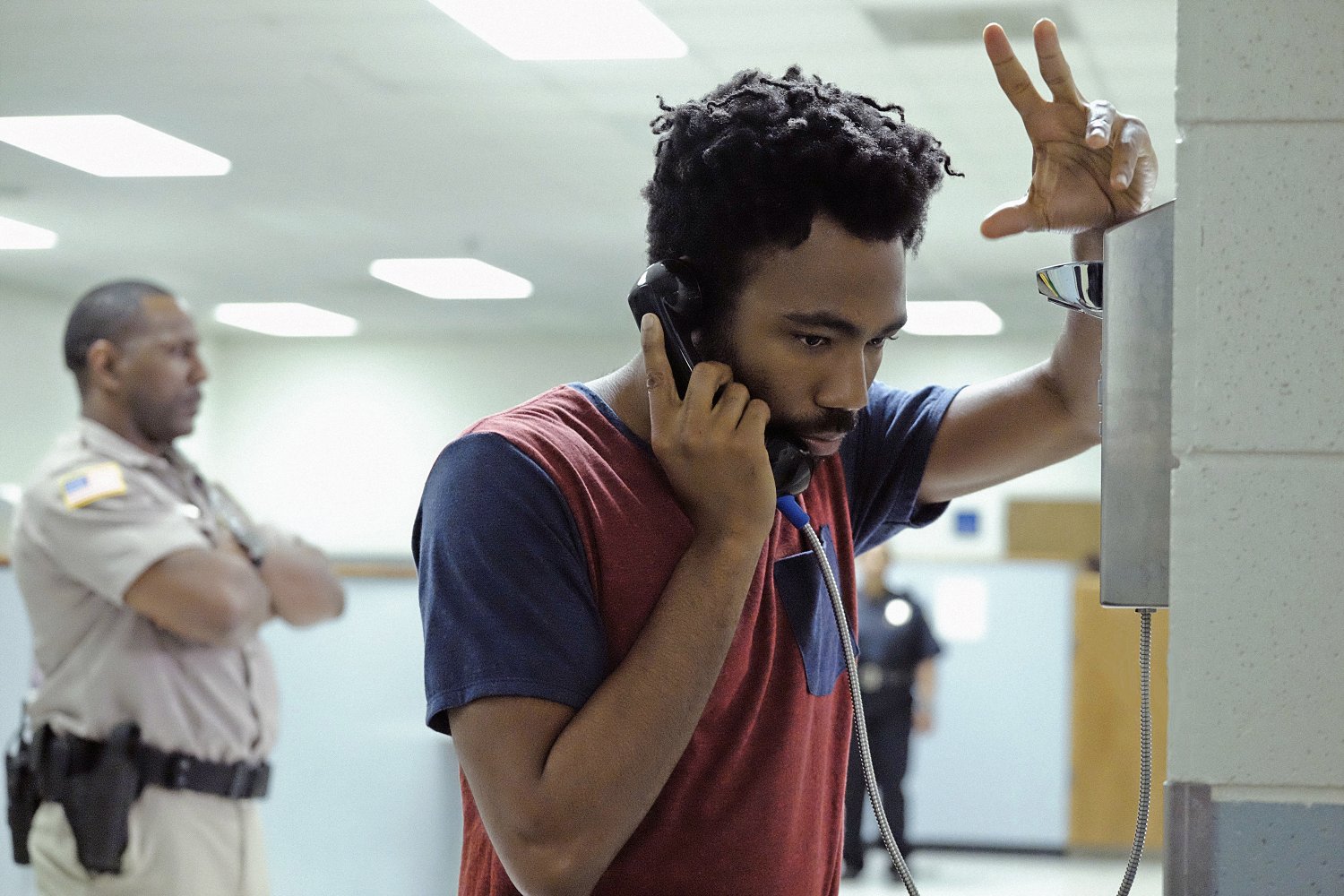In the second episode of Atlanta, Donald Glover’s new project for FX, Glover’s character, Earnest “Earn” Marks finds himself in the holding cell of a jail, waiting for his file to be processed and for someone to pay his bail. He sits in a plastic chair for the bulk of the episode, as a cast of individuals charged with various crimes swirl around him.
During one scene, a person with a mental illness begins to dance in the middle of the holding cell, wearing a patient gown, leaving his back and white underwear exposed. The police officers and guards in the room chuckle at the man’s antics, while remarking that this particular person is in the jail every week “cutting up.”
As the camera pans back to the person, we see that he’s holding a small paper cup. He smiles and looks around the room, before moving quickly to the bathroom. The other people in the holding cell realize the man is about to put his cup in the toilet and drink the water. Once he does, the whole crowd in the cell laughs. But not Earn.
“Why is he in here every week?” Earn asks. “He looks like he needs help.”
“Hey man, shut up,” responds a nearby guard.
As the scene continues a white guard enters the room. Noting that the person, named Lee, is back and drinking toilet water again, the guard chuckles.
“How’s it going, Lee?” he asks.
Lee turns to him, and a weak stream of water shoots from his mouth towards the guard.
It happens in an instant. A new guard comes from behind and forcibly restrains Lee. The white guard draws his night stick, opens it like one might open a plastic lightsaber, and beats Lee before several officers tackle him to the ground. An alarm goes off as Lee, not visible underneath the three officers controlling him, wails.
The others in the cell look away. It is extremely painful to watch.
I cried watching #atlantafx the other night, so proud of my bro Donald Glover talking #mentalhealth on national tv pic.twitter.com/mitOVPQJxG
— Chance The Rapper (@chancetherapper) September 9, 2016
In just two episodes, Atlanta is poised to be the most essential TV series of the year. That’s in large part due to the strength of scenes like these. The scene is brutally shot and perfectly captures the distinct knowledgeable sense of weariness that many of us feel around deeply important issues of our time.
Atlanta is by no means the first show to grapple with these tough subjects. Netflix’s acclaimed Master of None, the brainchild of Aziz Ansari and Alan Yang, made these issues a part of it’s DNA. It devoted entire episodes to the immigrant experience and the lack of diversity in Hollywood.
The two shows share a lot in common. Both are the projects of popular non-white comedians who were once on acclaimed sitcoms. Both are comedies featuring largely non-white casts. And both are incredibly current, made in the present, about the present, for the present.
Yet despite these similarities, Atlanta and Master of None present two wildly different ways of grappling with important issues. One, weaves these issues around different juncture points in its narrative before moving on with it’s story. The other, tackles the issue head on, devoting entire episodes around a single, explicit theme.
For instance, take the seventh episode of Master of None, titled “Ladies and Gentlemen.” The episode is centered everyday sexism women face. It’s cold open juxtaposes the terror a woman feels as she is followed home from a bar, underscored by the soundtrack of Halloween, with a shot of Dev (played by Ansari) attempting to scrape dog poop of of his new “sneakies,” appropriately underscored by Bobby McFerrin’s “Don’t Worry, Be Happy.”
The issue is the central focus of the episode. In it, Dev helps get a man masturbating on a subway arrested, accidentally gives the director of the commercial he’s shooting the idea to give all the roles currently played by men to women, and finally explicitly acknowledges that the director’s snubbing of his girlfriend is an example of subtle everyday sexism
Even though this approach to a single issue is, at times, heavy handed (at one point, one character explicitly defines the word feminism), each of these episodes of Master of None does an excellent job of exploring these issues. The show’s characters leave the screen having arrived at incredibly nuanced, thoughtful opinions. Because this approach is so blunt, it’s likely that you leave each of these episodes at the very least open to changed opinions on sexism, diversity in media, and aging.
At least up to this point, Atlanta has taken a very different approach. It’s method for bringing up these issues is less exhaustive. While Master of None devotes entire episodes to specific issues, Atlanta sequesters them into single scenes.
Later in the second episode, Earn finds himself in between Johnny, a cisgender man, and Lisa, a transgender woman. The two were reconnecting, apparently they had once been intimate, when another person in the jail broke the news to Johnny, who had been talking as if Lisa, his ex, was a cisgender woman.
“Your girl?” the onlooker said, “My n—–, that’s a man.”
Johnny quickly became upset as the other men in the cell ruthlessly made fun of him for having sex with another man outside of jail, calling him gay. Even as Earn assertively mutters that “sexuality is a spectrum,” the other men’s taunts get to Johnny. He stands, fists clenched.
“I know what you all think she is, but I ain’t on that f—– s—,” he cries.
There are several important points around gender, sexuality, and race being made here in an incredibly nuanced fashion. It is particularly notable that none of these points are at all important outside of the context of this scene. As the scene ends and Earn eventually leaves the jail, the whole matter of Johnny and Lisa dissipates behind him.
For many of us, this is fairly representative of how we think about and engage with these issues in our own lives. I personally strongly believe that severe mental health illnesses like schizophrenia and bipolar disorder should be treated in hospitals and not in prisons. Yet I am privileged enough to not have to think about this for any particularly long period of time. Perhaps if I see a person experiencing homelessness who looks like they need mental health care, it crosses my mind. But it only stays there for a short while, I am thinking about something else in no time.
The second episode of Atlanta mimics this reality. The discussion of extremely important issues are isolated incidents within the context of the larger plot. The scene featuring Lee and the scene with Johnny and Lisa are preceded by a hilarious monologue from a man loudly regretting the decisions that led him to the jail and proceeded by Earn reuniting with the mother of his child outside after being bailed out. As he assures Vanessa (played by Zazie Beetz) that their daughter won’t remember ever picking up her father from jail, the episode ends. Earn is thinking about something else.
But interestingly enough, as the end credits roll, you are still thinking about Lee. You are still thinking about Johnny. You are still thinking about Lisa. Because of their extreme poignancy, these scenes stand out, even among the high standard set by the whole episode. The scenes with a moral message stick with you.
Considering this, it’s tough to say whether Master of None or Atlanta will be a larger conversation starter regarding the issues they attempt to raise. Though Master of None devotes more actual time to the discussion of these issues, Atlanta has thus far made us experience what it is like to live them. Although we’re only two episodes in, I’m inclined to think that Atlanta has the edge on this front.
I’m still thinking about Lee.






